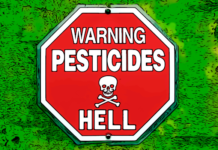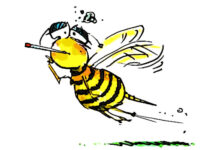I
pesticides
neonicotinoids
kill the
bees
, the wild ones as well as the melliferous ones. It is the final verdict of EFSA, European Food Safety Authority. (1) To the European Commission and the member states any consequent decision.
Neonicotinoid pesticides, no bees
A decisive choice stands before the European Commission and member states. Continue to tolerate the use of neonicotinoid pesticides in Europe or safeguard bee life. And so is the human one, at least one-third of whose food depends on pollination. (2)
Efsa, the European Food Safety Authority.
, has finally updated its earlier scientific risk assessments of three neonicotinoids-clothianidin, imidacloprid and thiamethoxam-which are indeed already subject to mild restrictions in the EU precisely because of the threat they pose to bees.
Current scientific evaluations update previous ones, which date back to 2013 and have already led to initial restrictions on the use of such substances. The broader field research-in Hungary, Germany and the United Kingdom-has meanwhile shown how the damage caused by clothianidin and thiamethoxam to bee populations extends into the seasons following their use. (3)
La Pesticides Unit by Efsa then undertook extensive data collection and systematic literature review to collect all scientific evidence published in recent years ‘The availability of such a large amount of data allowed us to obtain very detailed conclusions‘, explained Jose Tarazona, head of the European Food Safety Authority’s Pesticides Unit. ‘Overall, the risk for the three types of bees we evaluated is confirmed.‘
EFSA’s conclusions. will now be shared with the institutions responsible for risk management, namely the European Commission and member states. Who should take action on the conditions of use of these pesticides as soon as possible. In the direction of total ban, without wasting time on mild measures that are sure to harm the environment and the community.
Bees, environment, biodiversity. What solutions?
It is necessary to rethink strategies Of development of global agriculture. The
agrotoxics
are not the solution, nor are genetic modifications (‘traditional’ GMOs or ‘new GMOs’
) in their service. And even when they can be presented as such – as the University of Pisa has vainly attempted, a few weeks ago-they still present risks that should not be overlooked. For the health of workers and residents, the environment and biodiversity, at least.
The way forward
is that of
agroecology
, that is, the use of environmentally and biodiversity-friendly farming practices. Directing research toward new paths marked by the least possible use of chemistry in agriculture. The French Institute for Agricultural Research
has, after all, shown in a study published in
Nature
in 2017, (4) how a drastic reduction in pesticide use does not harm yields.
Precisely in Europe
– where environmental conditions are not compatible with the development of intensive monocultures capable of competing with the global market for
commodities
agricultural – experimentation with innovative agronomic techniques has begun. Like planting strips of wildflowers, at field margins to mitigate pest migration on crops. Ecological compensation areas, which precision agriculture can save from harvesting.
Dario Dongo
Notes
(1) Cf. https://www.efsa.europa.eu/en/press/news/180228
(2) ‘
It appears that perhaps one-third of our total diet is dependent, directly or indirectly, upon insect-pollinated plants’
. McGregor, S.E. on.
Insect pollination of cultivated crop plants,
USDA,
Agriculture Handbook
496, 1976
(3) Cf.
Country-specific effects of neonicotinoid pesticides on honey bees and wild bees.
, in.
Science
, 2017. doi 10.1126/science.aaa1190
(4) For further discussion, please refer to the free ebook GMO the Great Scam, on https://www.greatitalianfoodtrade.it/libri/ogm-la-grande-truffa
(5) V.
Reducing pesticide use while preserving crop productivity and profitability on arable farms
, in Nature Plants 2017. doi 10.1038/nplants.2017.8
Dario Dongo, lawyer and journalist, PhD in international food law, founder of WIISE (FARE - GIFT - Food Times) and Égalité.









